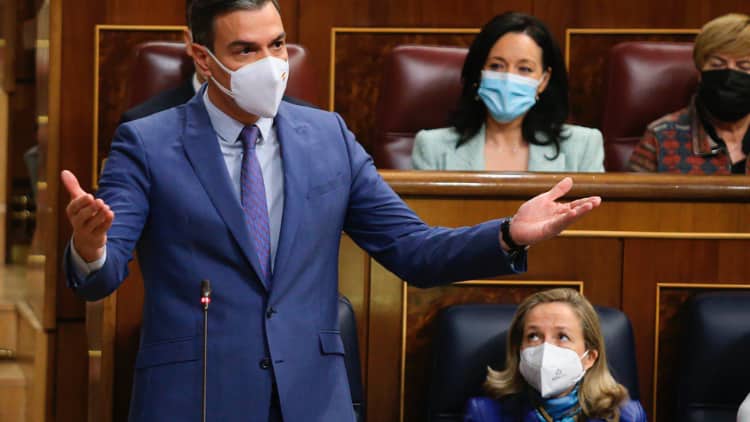Ángel Collado
Pedro Sánchez has guaranteed himself stability in power with a General State Budget that no national or international economic organisation believes.
The accounts, agreed with investments and subsidies to please his pro-independence and nationalist partners, clash with the forecasts of the European Commission, the International Monetary Fund, the Organisation for Economic Cooperation and Development, the Independent Authority for Fiscal Responsibility and the Bank of Spain.
The prime minister insists on selling a recovery that only his cabinet sees as clear, while experts place Spain at the bottom of the European Union in overcoming the crisis.
The strength of the coalition of socialists and communists in the Executive, supported in Parliament by nationalist and separatist groups, contrasts with the weakness or disbelief that his economic plans arouse.
Sánchez bases all his calculations for recovery on gross domestic product growth of 6.5 per cent this year and 7 per cent in 2022. The Bank of Spain last week refuted the government’s optimism and, in line with European and national economic institutions, left those forecasts at 4.5 per cent for this year and 5.9 per cent for next year.
The head of the Executive and his vice-president Nadia Calviño are reluctant to admit a reduction in growth forecasts that would force them to reformulate the State accounts with cuts or agreements to make spending unavailable as soon as these come into force on 1 January.
In order not to give in, the government is ignoring the circumstances that others are taking into account in their data projections: the uncertainty added to the economic situation by the new wave and variant of the COVID (omicron), the cabinet’s own delay in managing European funds for recovery, soaring inflation (5.5 per cent last month) and rising electricity and fuel prices.
If just three months ago Sánchez presented his government as the engine of the EU country that was going to recover first from the pandemic crisis, December’s figures place Spain in second-to-last place. The Bank of Spain sets the milestone of reaching pre-COVID GDP at the end of 2022 or early 2023, almost a year after Italy, France or Portugal.
The Spanish economy continues to lead all European economies in terms of deficit and public debt. It already owes 122.8 per cent of its annual Gross Domestic Product, according to data from the EU statistics office Eurostat. And in this context, Spain will be one of the countries most affected by the gradual reduction of public debt purchases by EU member states announced by the European Central Bank (ECB) for next year.
Pedro Sánchez will see the current debt channel to which he resorts to sustain the spending committed in his budgets cut back. The ECB buys up to 100,000 million euros a year of Spanish public debt and that figure may be less than half, according to initial estimates.
The government is ignoring this complicated economic outlook for the coming months, while social unrest grows with the rise in prices, especially electricity, a problem that was initially dismissed as a temporary problem according to official arguments and which is growing steadily. Spaniards are losing purchasing power at a rate unknown since the 2008 crisis, during the period of the previous left-wing government, then only the PSOE and with José Luis Rodríguez Zapatero at the head of the government.
As happened in that legislature, Sánchez prefers to ignore the warnings and avoids taking measures while the opposition, now Pablo Casado, insists that Spain is living on borrowed time and is threatened by bankruptcy. If the government hides or denies the seriousness of the economic situation, its opponents are waiting for the imbalance in the accounts that are now being approved to become even more evident at the start of next year and then come the adjustments that they believe will mark the second part of the legislature.
The data from the first quarter, especially those on budget execution, will tell whether the stability in power paid so generously to his communist and separatist partners will allow Sánchez to remain in government without making cuts, or whether he repeats another of his turns to do the opposite of what he promised.







